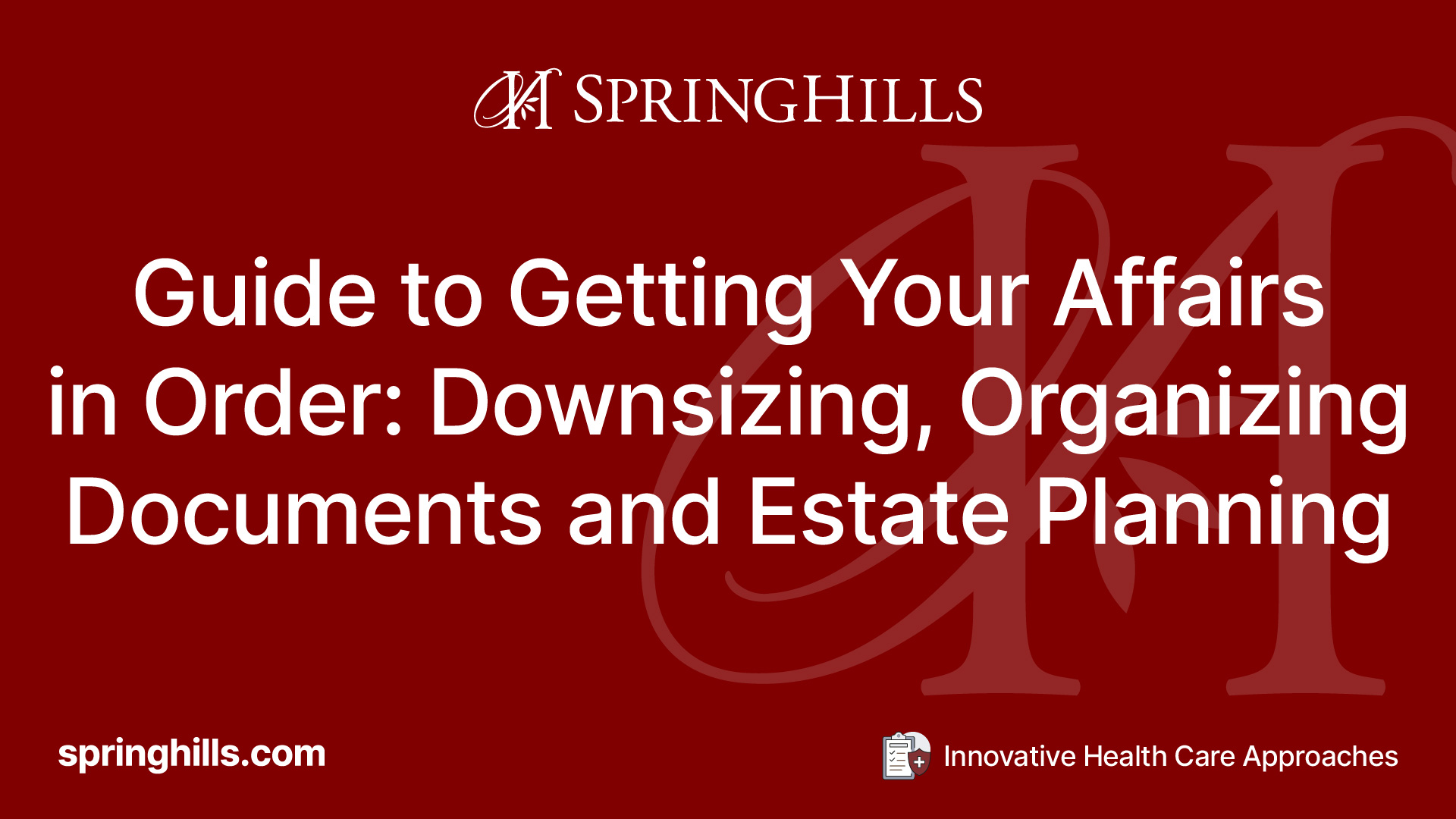
Guide to Getting Your Affairs in Order: Downsizing, Organizing Documents and Estate Planning
Downsizing for seniors made easy. Simplify life, get affairs in order, and embrace a new chapter.

Downsizing for seniors made easy. Simplify life, get affairs in order, and embrace a new chapter.
As seniors enter a new phase of life, downsizing can bring about numerous benefits. It's a process that involves reducing the number of possessions and streamlining living arrangements. This section explores the advantages of downsizing for seniors and provides a step-by-step guide to getting affairs in order.

Downsizing offers a range of benefits that can greatly simplify life for seniors. Some key advantages include:
Getting affairs in order is an essential step in the downsizing process. It involves taking stock of financial, legal, and personal matters to ensure a smooth transition. Here is a step-by-step guide to help seniors navigate this process:
By embracing the benefits of downsizing and taking steps to get affairs in order, seniors can simplify their lives and enjoy a smoother transition to a more manageable and fulfilling lifestyle.
Before embarking on the downsizing journey, it's important for seniors and their families to assess the situation and understand the need for downsizing. This process involves evaluating the current living situation, identifying priorities, and setting goals for the downsizing process.
The first step in assessing the need for downsizing is to evaluate the current living situation. Consider the following factors:
By honestly assessing these factors, seniors and their families can gain a clearer understanding of whether downsizing is necessary and beneficial. Seeking the advice of professionals in senior financial management, financial planning for seniors, or estate planning for seniors can provide valuable insights and guidance. Check out their article on senior financial management for more information.
Once the need for downsizing is established, it's essential to identify priorities and set goals for the downsizing process. This involves considering the following:
By identifying priorities and goals, seniors and their families can have a clear vision of what they hope to achieve through the downsizing process. This will guide decision-making and help determine the most suitable downsizing options.
Assessing the situation and understanding the need for downsizing is a crucial step in simplifying life for seniors. By evaluating the current living situation and identifying priorities and goals, seniors and their families can make informed decisions and begin the downsizing journey with confidence.
Once you've made the decision to downsize, the next step is to sort and organize your belongings and documents. This process involves decluttering and letting go of unnecessary items and finding a system to organize the essentials. In this section, we will explore two key steps in sorting and organizing: decluttering and letting go, and organizing belongings and documents.
Decluttering is an essential part of downsizing. It involves going through your belongings and deciding what to keep, sell, donate, or discard. This can be an emotional process, especially when dealing with sentimental items. Here are some steps to help you through the decluttering process:
Once you've decluttered, it's time to organize the belongings and documents you're keeping. This step ensures that everything has a designated place and can be easily accessible when needed. Here are some tips for organizing your belongings and documents:
By decluttering and organizing your belongings and documents, you can make the downsizing process more manageable and efficient. Remember, it's important to take your time and be patient with yourself throughout this process. Seeking professional help and support, such as senior financial management or elder care planning, can also provide guidance and assistance in managing your affairs.
When downsizing for seniors, making decisions about what to keep, sell, donate, or discard can be a challenging task. However, with careful consideration and a systematic approach, this process can be manageable. Here are some steps to help seniors determine what to keep and how to handle sentimental items.
When downsizing, it's important to assess belongings and determine which items are essential, practical, and hold sentimental value. Seniors should consider the following factors when deciding what to keep, sell, donate, or discard:
By carefully evaluating each item based on these factors, seniors can make informed decisions about what to keep, sell, donate, or discard. This process helps to streamline the downsizing experience and ensure that belongings are optimized for the new living arrangement.
When downsizing, sentimental items can present unique challenges. These items often hold deep emotional value, making it difficult to part with them. Here are some strategies to help seniors handle sentimental items during the downsizing process:
Downsizing can be an emotional journey, especially when it comes to sentimental items. It's important to be patient and compassionate with oneself during this process. Seeking support from professionals, such as estate planning for seniors or elder care planning, can provide guidance and alleviate some of the emotional burden associated with downsizing.
By following these approaches to decision-making and handling sentimental items, seniors can navigate the downsizing process with greater ease and peace of mind.
When it comes to downsizing for seniors, there are various options to consider when deciding what to do with possessions that are no longer needed or wanted. The following options can help seniors simplify their lives and transition to a more manageable living situation.
Selling possessions is a popular choice when downsizing. It not only helps seniors declutter their living space but also provides an opportunity to generate some extra income. Seniors can choose to sell their items through various channels, such as online marketplaces, yard sales, or consignment shops. It's important to research the current market value of items to ensure fair pricing and attract potential buyers.
To make the selling process smoother, seniors may consider seeking assistance from family members, friends, or professional estate sale companies. These individuals or organizations can help with pricing, advertising, and managing the logistics of the sale. Additionally, there are online platforms specifically designed for selling used items, making it easier to reach a wider audience.
Another option for downsizing is to donate possessions to charities. This not only helps seniors declutter their space but also allows them to contribute to a greater cause. Many charities accept a wide range of items, including clothing, furniture, household goods, and more.
Before donating, it's important to research local charities and their donation guidelines. Some charities may offer pick-up services for larger items, while others may require drop-off at designated locations. Donating to charities can provide seniors with a sense of fulfillment, knowing that their belongings will benefit those in need.
For sentimental items or possessions with emotional value, gifting them to family members or close friends can be a meaningful option. By passing down cherished items, seniors can ensure that they remain within their circle of loved ones. This not only allows for the preservation of family history and memories but also provides a personal connection to the items in question.
When gifting items, it's important to have open and honest discussions with family members and friends. Seniors should communicate their intentions and ensure that the recipients are interested in and willing to take on the responsibility of the items. These conversations can help avoid misunderstandings and ensure that the items find a new home where they will be appreciated.
By considering these downsizing options - selling possessions, donating to charities, and gifting to family and friends - seniors can effectively simplify their lives while ensuring that their belongings are put to good use. It's important to assess each item's value, sentimental significance, and practicality to determine the most suitable option.
Once the sorting, organizing, and decision-making stages of downsizing for seniors are complete, it's time to move forward with a transition plan, seek professional help and support, and embrace the benefits of downsizing.
Creating a transition plan is essential to ensure a smooth and organized move. This plan should outline the necessary steps and timelines for the downsizing process. Here are some key considerations to include in your transition plan:
By creating a detailed transition plan, seniors and their families can navigate the downsizing process more effectively and reduce stress during the move.
Downsizing can be an emotionally and physically challenging process. Seeking professional help and support can provide seniors and their families with valuable assistance and guidance. Consider the following options:
While downsizing may initially feel daunting, it also offers numerous benefits for seniors. Embracing these advantages can help seniors transition to a more manageable and fulfilling lifestyle. Some key benefits of downsizing include:
By recognizing and embracing the benefits of downsizing, seniors can transition to a more manageable and fulfilling lifestyle as they embark on the next chapter of their lives.
It’s never too early to start planning ahead. In fact, the earlier you start, the better prepared you’ll be for any unexpected events.
If you don’t have a will or trust, it’s important to create one as soon as possible. This can ensure that your assets are distributed according to your wishes and can prevent legal battles among family members.
A health care proxy is a legal document that allows you to appoint someone to make medical decisions on your behalf if you’re unable to do so yourself.
When choosing a funeral home, consider factors such as location, cost, services offered, and reputation. You may also want to ask for recommendations from friends and family members.
Long-term care insurance is a type of insurance that helps cover the costs associated with long-term care services, such as nursing homes and assisted living facilities. It can provide financial support and peace of mind for both seniors and their loved ones.
As we wrap up this guide, it's important to remember that getting your affairs in order is a process. It may take time and effort to gather all the necessary documents, make end-of-life decisions, and plan for long-term care. However, by taking these steps, you can feel more in control of your future and provide peace of mind for yourself and loved ones. Remember to revisit and update your plans as needed, especially after major life events such as the birth of a grandchild or the purchase of a new property. With careful planning and organization, you can feel confident in your ability to navigate whatever the future may bring.
https://www.homecareassistanceoshkosh.com/older-adult-put-financial-and-legal-affairs
https://www.elderlifefinancial.com/resources/legal-documents-get-your-affairs-in-order
https://www.waterstonesl.com/ways-to-help-aging-parents-get-their-affairs-in-order



Navigating Billing Codes for Assisted Living Services

Exploring Assisted Living Facilities in Bangalore: A Comprehensive Guide

Explorando el Concepto de Vida Asistida y su Relevancia
